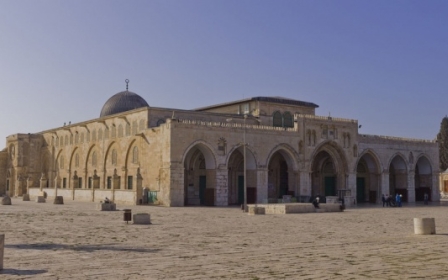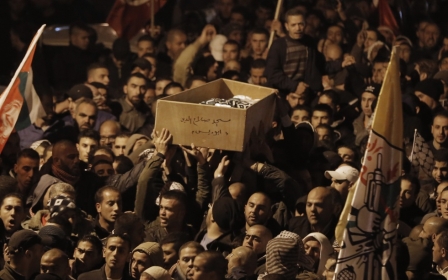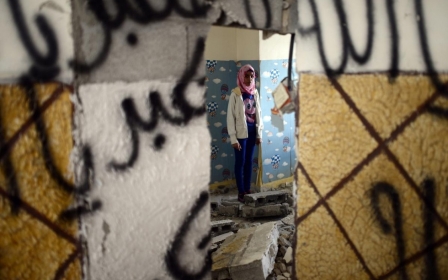Palestinians endure increasing Israeli brutality in the Holy City

Israeli security forces are a constant presence on the streets of East Jerusalem. In the old city, soldiers in khaki patrol every street. Neighbourhoods like Silwan are fortified with wire-covered watchtowers and armoured cars, manned by equally armoured officers. On roads leading from the West Bank, police stop to check to IDs of passers-by on a regular basis, searching for “infiltrators” that may have crossed over the wall illegally.
Foreign visitors often feel intimidated by such a heavily armed presence in Jerusalem’s historic streets, though most are unlikely to face serious harassment or questioning. For the Palestinians that live here, however, it’s a different story.
According to the prisoners’ rights association Addameer, about 700 Palestinian Jerusalemites, the majority of whom were children, were arrested in Jerusalem in the month of July 2014 alone, and from that month interrogation and detention of Palestinians continued to soar. In neighbourhoods like At-Tur, Issawiya and the old city, all in East Jerusalem, Palestinian residents complain of harassment and pressure from predominantly Jewish and Druze police officers – behaviour which they believe is based on racial profiling.
Thaer, who lives in Silwan and works in West Jerusalem, says that he and his friends are regularly harassed by the armed border police that patrol every street of the city. At 20, dressed in a tracksuit and with close-cropped hair, he smokes constantly, speaking confidently in English. Police officers, he says, routinely search him, confiscate his belongings, or question him aggressively, implying he shouldn’t be in areas of the city other than where his work or home is located.
“Every day I go out, they stop me, they go in my car. They ask me, ‘have you got drugs’, or, ‘do you have knife?’” he told Middle East Eye. “They go through the car looking for something, looking through the whole car. It takes 20 minutes every day. He looks at you like you’re a small thing, and he’s big.
“That makes a problem,” Thaer continues. “I didn’t want to make a problem with you but now I want to make a problem with you. Why? Because you scream at me. You get somebody in the street, look in his bag, take his ID. Why are you doing that? We’re Arab people, human. Just feel it a little bit.”
Often, young men like Thaer are reluctant to report the intimidating treatment they experience: most feel there's just no point. But in the past, some incidents of police misconduct have been highlighted in the law or media. Last September, three Border Police officers were ordered to compensate a Jerusalem man after they beat him in the street in front of his son. Videos uploaded to Youtube of border police officers humiliating Palestinians – making them slap themselves, or sing absurd and offensive songs – have also drawn attention to some of the abuses that take place in the Holy City.
Often, however, scrutiny is reserved for cases of police abuse that occur in unusual circumstances. Last year, the case of Tareq Abu Khdeir, who was brutally beaten by police then arrested, received high levels of media attention. But the fact that the 15-year-old was an American citizen and the cousin of Mohammed Abu Khdeir, the teenager murdered by Jewish extremists last summer, meant his assault was far more visible than other incidents – a fact Tareq recognised when he told a US audience that “you only know my story because I am an American.”
Abu Khdeir’s experience was also tied to a dramatic summer escalation in Jerusalem, which led, too, into dramatically heightened levels of policing into autumn. Then, at least 1,000 extra police officers filled the streets, cutting off the entrances to some neighborhoods entirely. Residents said they were continually issued with fines and warnings for small transgressions like traffic offences, their cars stopped and searched as they tried to drive in and out of their communities.
16-year-old Alaa Abed, who lives in Issawiya, told MEE that the period's intensity was just an escalation of the status quo.
“I sometimes feel that they’re just trying to prevent me from going to school,” he said. “They make us scared when we go out. When we’re going on buses, they tell us to go outside the bus. And sometimes we’re scared to stay in front of our houses because the police are always there. One day I was going down to the street and there was a police just outside the house. I was scared – I thought they were going to take me or going to hurt me,” Abed continued. “So I just ran.”
Police spokespeople insist that the police presence condemned by Jerusalemites like Ala’a is justified by security demands. When MEE asked spokesperson Micky Rosenfeld about apparent inequalities in policing, he denied there was any discrimination in policy or practice, and even argued that Arabs living in Jerusalem were glad to live under the jurisdiction of Israeli police.
“I think if you ask people living in the Palestinian Authority controlled areas of Judea and Samaria, and if you ask people whether they would prefer being under the Palestinian Authority or Israeli authority, they would say they would prefer living in Israeli jurisdiction,” he said. “They’re benefitting from the option of receiving help when it’s a medical emergency, or a fire, or internal disputes.”
Residents of Silwan and Issawiya, however, just laugh at that suggestion. Israel might have unilaterally annexed the east of Jerusalem, but it’s still recognised as a city under occupation. That means most residents regard the forces that are policing their neighbourhoods as totally illegitimate - in short, they shouldn’t be there at all.
According to Mick Dumper, an academic specialising in the policing in Jerusalem, that status limits the similarities that can be drawn between discriminatory policing in Jerusalem and other areas, such as the United States. Security in Palestinian neighbourhoods operates more as occupying army than a law enforcement agency, he explains, and in the absence of measures that protect both Arab and Jewish communities, the police force becomes “an instrument of one community, imposed by force and highly militarised.”
“The Israeli government, according to the Palestinians, they’re not supposed to be there,” Dumper explained to MEE. “They’re saying it’s their territory, and that this is an army of occupation rather than an army that’s being discriminatory. It’s being discriminatory but it’s not just being discriminatory. Jerusalem is not just a divided city, it’s a divided city in a state that’s being contested.”
Thaer, who works in the west of Jerusalem, agrees that Rosenfeld’s impression is far removed from the feelings of most Palestinian Jerusalemites.
“They publish this to the media as much as they can. But they don’t speak to the other side to see what it’s like,” he said. “Maybe I’m happy because I’m next to my house, my neighbours, my people, because we are one hand here. That makes me happy. But from Israel? No way.”
With low monthly incomes, high costs and families to care for, Thaer and his friends know that run-ins with the police and their concurrent fines can mean serious financial setbacks. Arrests, stop-checks and fines, he says, are serious obstacles to a normal life for Palestinians – and create bitter resentment among the young.
“They come to you, you’re 20 years-old, trying to build your house, and the police take your car,” he said. “You feel like somebody broke you, or somebody put a knife in your heart. You want to stop, that’s it. You will say, I don’t wanna live, my life is stopped, just like that.
“You can’t look to the future. The future for us, to be alone without the Jewish,” Thaer continued. “The policeman told you we’re happy. Who’s happy? The Jewish, they are happy maybe, the police, they are happy. I’m a Muslim. They want us to work with the police. But why would I want to do that? Everybody here is my family.”
New MEE newsletter: Jerusalem Dispatch
Sign up to get the latest insights and analysis on Israel-Palestine, alongside Turkey Unpacked and other MEE newsletters
Middle East Eye delivers independent and unrivalled coverage and analysis of the Middle East, North Africa and beyond. To learn more about republishing this content and the associated fees, please fill out this form. More about MEE can be found here.




